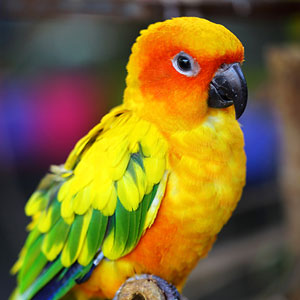
Ensuring Your Pet Bird Receives Adequate Sleep
Most adults need between six to eight hours of sleep each night. How do you act when you haven't received enough sleep? Are you on edge, crabby, and have a hard time concentrating? Likewise, adequate sleep is necessary to maintain your bird's health and good behavior. Without necessary sleep, birds can become very irritable, have low energy, be more susceptible to illness, and acquire behavioral problems. Lack of sleep can lead to excessive screaming, aggression, biting, and feather picking.
Because birds are light-responsive, they sleep when it is dark and wake up with light. This goes back to their lives in the wild—birds tend to sleep during the nighttime hours because that's when most of their predators in the wild go to sleep.
Birds need adequate sleep in order to function properly. Sleep gives their bodies a chance to restore energy and regenerate cells. Birds generally need about 10 to 12 hours of sleep per night. They are are creatures of habit, so it is best to develop some sort of routine for sleeping. When you are consistent, your bird will know what is expected of him.
How Do You Make a Bird Go To Sleep
If your bird's cage is in a highly trafficked area of the house, you might want to transfer your bird to a designated sleep cage and place the cage in a quiet and undisturbed room for the night. Noises, such as the TV late at night, can easily keep your bird awake. Birds have very keen hearing, and even walking past a covered cage can keep him awake. However, covering your bird's cage does have advantages. Your bird will be less likely to wake up with the sun if you cover his cage. Covering his cage will also help with night frights—moving shadows or headlights that scare your bird at night.Why is My Bird Restless at Night
Sleep is a good indicator of a bird's health. If your bird is sleeping too much, this might be an indication that he isn't feeling well. Also, it's not a good sign if your bird starts sleeping on the floor of his cage. Birds don't normally sleep on the ground because they are exposed to predators. Therefore, most birds sleep on the highest perch in their cage. If your bird's sleeping habits change drastically, check in with your avian veterinarian.Setting a consistent sleep schedule for both you and your bird can be very beneficial! You will both be more well-rested, happier, and healthier!
Discover More!
Full-Spectrum Lighting for BirdsFeather Picking in Pet Birds
Training Your Bird to Stop Screaming
Return to Bird Articles


